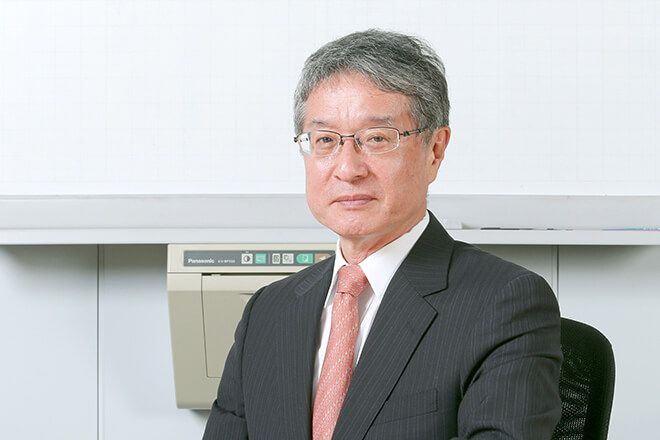Top Management Message
To Accomplish the Corporate Mission in the History of the Emergence of Humankind from Nature
The three theories of revolution in the global era and the role of a leader of a new industrial revolution

The emergence of society followed the advent of humankind, and we face corporate management challenges. Looking back through pre-human history, it is thought that the universe was born roughly 13.8 billion years ago, the sun, solar system, and the Earth were born 4.6 billion years ago, life emerged 4.0 billion years ago, human ancestors evolved 7.0 million years ago, and humankind (homo sapiens) emerged some 200,000 years ago.
Next, three theories of revolution (the five-stage theory of revolution, the three-stage theory of revolution, and the four-stage theory of industrial revolution) exist as perspectives on major changes in human history (revolutions).
The first perspective is the macro-range five-stage theory of revolution that Shuntaro Ito advanced in 1985 in “Hikaku Bunmei (Comparative Civilization)”, a theory that covers the period from the origin of humankind some 200,000 years ago until the formation of today’s human society. The theory holds that human culture developed through five stages: the human revolution (natural selection from human predecessors to homo sapiens), the agricultural revolution (permanent settlement arising from the transition to cultivation and breeding that occurred some 10,000 years ago), the urban revolution (the formation of cities due to the development of permanent settlement), the spiritual revolution (the creation of philosophy and ethics accompanying complication of human relations following the concentration of population in cities), and the scientific revolution (the modernization of the world beginning in 17th century Europe). The scientific revolution is currently in progress.
The second perspective is the mid-range three-stage theory of revolution that Alvin Toffler set out in 1980 in “The Third Wave”, which covers a period of about 15,000 years ago from the beginning of agriculture to today’s information society. That is, the First Wave is the agricultural revolution, and the start of cultivation some 15,000 years ago transformed the culture of the preceding hunter-gatherer society. The concept of this agricultural revolution is different from that of the 18th century agricultural revolution, as the term is originally used in the study of history, in that it corresponds to the Neolithic revolution or a revolution in agricultural techniques. The Second Wave is the industrial revolution, which occurred from the 18th to the 19th centuries. As a result of industrialization, the previous agrarian society gave way to an industrial society. The Third Wave is the post-industrial society (information society) brought about by an information revolution. Toffler began propounding this theory at the end of the 1950s, when many countries were transitioning from the Second Wave to the Third Wave. The information revolution is currently in progress.
The third perspective is the micro-range four-stage theory of industrial revolution that I myself advanced in 2010 in “The Fourth Industrial Revolution”. It covers a period of some 300 years from the industrial revolution to today’s Internet of Things (IoT) and artificial intelligence (AI) revolution. In 2011, Germany announced Industry 4.0, a concept and national strategic project aimed at the digitization and computerization of manufacturing announced by Germany’s National Academy of Science and Engineering and promoted by the German government. The theory holds that there is a first industrial revolution (the motive power revolution: the spinning machine, the steam engine, coal and ironmaking), a second industrial revolution (the heavy industrial revolution: the internal combustion engine, power generation and transmission), a third industrial revolution (the digital information revolution: communication, semiconductors, computers), and a fourth industrial revolution (the digital transformation revolution: the IoT, big data, AI). The fourth industrial revolution, too, is currently in progress.
If we are to embrace the abovementioned three theories of revolution currently in progress, it is likely that the leaders of that social progress will be truly global companies. Specifically, to advance a scientific revolution in accordance with the first theory of revolution, it is necessary to promote the further development of science and incorporate the latest results of science in corporate management. To promote further development of the information society in accordance with the second theory of revolution, it is necessary to become a digital transformation leader in accordance with the third theory of revolution based on IoT, AI, and other leading-edge technologies. In such times, Internet Research Institute, Inc. intends to demonstrate to the fullest the benefits of having established a parent company (Internet Research Institute Ltd *) in Israel, a major power in science and technology, while leveraging the characteristics of an R&D-driven company that originated in Japan. And, in the age of the global economy, we intend to practice corporate management reflecting a civilizational perspective.
*On August, 2018, Internet Research Institute Ltd listed on the Tel Aviv Stock Exchange.
June 2019
Hiroshi Fujiwara
President and CEO
Internet Research Institute, Inc.
